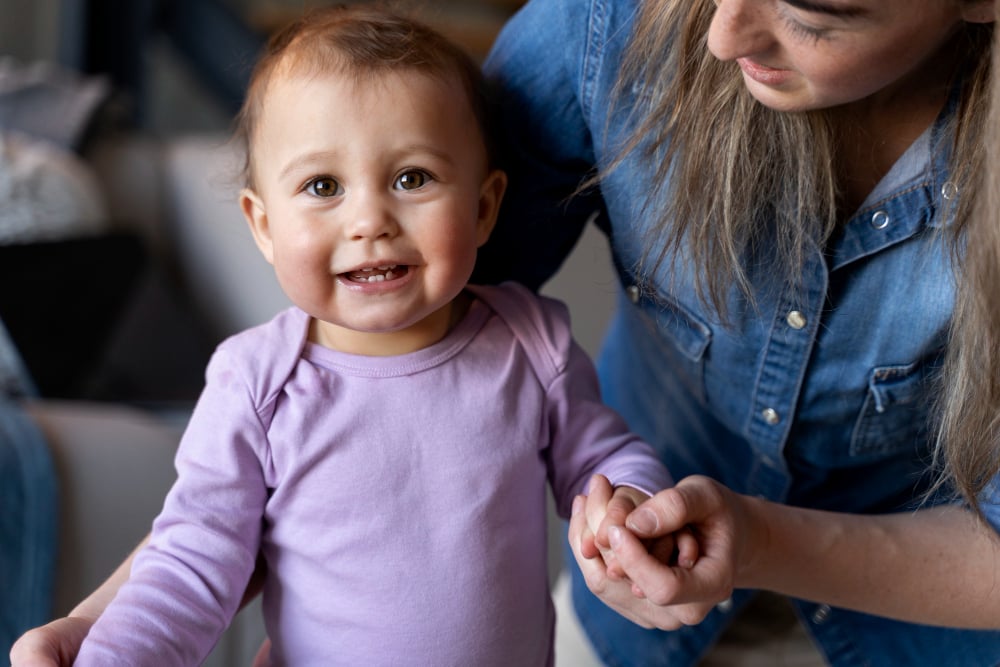Secure Attachment in Early Childhood
Attachment is the emotional bond that forms between an infant and caregiver, and it is the means by which a helpless infant gets its primary needs met. It then becomes an engine of subsequent social, emotional, and cognitive development. The early social experience of the infant stimulates the growth of the brain and can have an enduring influence on the ability to form stable relationships with others
Insecure attachment early in life may lead to attachment issues and difficulty forming relationships throughout life. Signs and symptoms may include:
- Unexplained withdrawal, fear, sadness, or irritability
- Sad and listless appearance
- Not seeking comfort or showing no response when comfort is given
- Failure to smile
- Watching others closely but not engaging in social interaction
- Failing to ask for support or assistance
- Failure to reach out when picked up
- No interest in playing peekaboo or other interactive games
Through close, caring relationships with a primary caregiver, attachments are formed. These attachments are essential for infants and toddlers to develop in all areas. Infants and toddlers learn about their world through their senses, so educators plan environments and activities that encourage children to touch, taste, smell, listen, and interact in any way that meets that child’s needs. Infant and toddler individual plans will include feeding and diapering schedules as these will be unique to each child. It is important to keep infants and toddlers on a familiar schedule to ensure appropriate growth and development.
Routines are opportunities for the adult and the child to connect, interact, communicate, and accomplish tasks in cooperation with each other. Through individualized care routines with a responsive, trusted adult, each child can learn that he or she is valued, included, and a part of the community. When infants and toddlers are included as active participants during routines such as meals and diapering, they learn about life skills, self-care, and cooperative relationships.
Infant and toddler planning is designed to meet unique and individual needs that include:
- Close, caring relationships with a primary caregiver.
- Predictable routines and environments.
- Home/School connections.
- Hands-on exploration and play.
Interested in learning more about supporting infant and toddler development? ChildCareEd offers many training courses designed to provide strategies and best practices to caregivers as they work with young children. Visit us today to see how our training courses can support your needs.
- Pediatric RSV First Aid & CPR/AED
- 45 Hour Preschool Methods and Materials
- 45-Hour Infant and Toddler Curriculum
- 45 Hour Infant and Toddler Methods and Materials
- CDA Bridge Bundle: Infant/Toddler without Portfolio Review
- CDA Bridge Bundle: Family Child Care without Portfolio Review
- CDA Bridge Bundle: Preschool without Portfolio Review
- Texas Director Credential
- CDA Infant/Toddler: Parent Relationships
- Building secure attachments in group care: practical routines that work
- Active Supervision: The Only Way to Care for Children
- Secure Attachment in Early Childhood
- Bridging the Gap between the 90 hour and CDA Credential for Maryland providers
- Developmental Milestones of Children Ages 1-3
- Managing Behaviors in the Early Childhood Education Classroom
- Nurturing Hearts and Minds: The Critical Role of Social-Emotional Learning in Early Childhood
- Building Relationships: Connecting with Children and Families in Preschool
- Childcare Providers are Shaping the Next-Gen by Guiding Children through their Formative Years
- How to Handle Separation Anxiety in New Preschoolers: A Teacher's Guide
- Goodbye Glitter Glue, Hello Growth: Child Development Milestones to Watch for in the New Year
- 7 Skills Every Childcare Provider Should Master
- Infant Toddler CDA vs. Preschool CDA: Which One is Right for You?
- How Cultural Influences Shape Child Development
- The Role of Attachment in Early Childhood Development
- Understanding Separation Anxiety in Young Children